

A black man—Barack Obama—sits in the Oval Office. A black woman—Oprah Winfrey—joins Warren Buffett and Bill Gates on the Forbes magazine list of richest individuals in the world. A black couple—Jay-Z and Beyonce—own a basketball team and buy an $80,000 diamond-encrusted Barbie doll for their one-year-old daughter. With such examples of impressive success and vulgar excess it’s easy to think that America’s long history of racial inequality has come to an end.
But then along comes a Brandeis University study showing that even as racial inequalities in terms of education and income have narrowed, the gap in wealth between black and white families has dramatically widened. Between 1985 and 2009, the gap in wealth between white and black families nearly tripled. It may be tempting to imagine that poor choices or lack of a work ethic can explain the disparity, but the study found that for the most part, the wealth gap is not the result of differences in education,
» Read more about: The Winner-Take-All Economy: A Black and White Story »
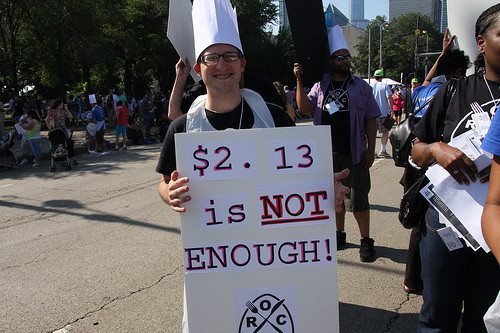

For Merleane S., a 19-year-old, single mom, her work shift on March 15 included taking and filling orders at a fast food restaurant in Palm Coast, Florida. She was earning the state’s minimum wage of $7.79 per hour. Similar to other U.S. workers, she was trying to make sure her family was secure.
That same day, in the nation’s capital, lawmakers in the U.S. House of Representatives unanimously voted against an amendment to H.R. 803, a job training bill. That amendment would have gradually increased the federal minimum wage from $7.25 an hour to $10.10 an hour by the end of 2015.
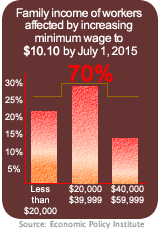 The amendment marked one of the most recent efforts regarding an issue that is gaining momentum nationally — an increased minimum wage. If the idea is approved, it would affect millions of workers across the income spectrum, including the middle class.
The amendment marked one of the most recent efforts regarding an issue that is gaining momentum nationally — an increased minimum wage. If the idea is approved, it would affect millions of workers across the income spectrum, including the middle class.
Merleane,
» Read more about: Not Only the Poor Benefit from Raised Minimum Wage »


 Bad news on the economy. It added only 88,000 jobs in March – the slowest pace of job growth in nine months.
Bad news on the economy. It added only 88,000 jobs in March – the slowest pace of job growth in nine months.
While the jobless rate fell to 7.6 percent, much of the drop was due to the labor force shrinking by almost a half million people. If you’re not looking for work, you’re not counted as unemployed.
That means the percentage of working-age Americans either with a job or looking for one dropped to 63.3 percent — its lowest level since 1979.
The direction isn’t encouraging. The pace of job growth this year is slower than its pace last year.
What’s going on? The simple fact is companies won’t hire if consumers aren’t buying enough to justify the new hires. And consumers don’t have enough money, or credit, or confidence to buy enough.
It’s likely Americans are beginning to feel the pinches of January’s hike in the payroll tax combined with the government budget cuts known as the sequester.
» Read more about: April Is the Cruelest Month As the Economy Crawls Along »


The Asian Pacific American Labor Alliance (APALA), the Los Angeles Alliance for a New Economy (LAANE) and other community groups took legal action against the proposed Chinatown Walmart today by filing a lawsuit against the City of Los Angeles. The lawsuit challenges the process by which the building permits were issued.
The plaintiffs allege that the Department of Building and Safety violated city and state laws which require public approval of the permits by the Community Redevelopment Agency/LA board. Eighty Chinatown residents, Walmart workers and community activists rallied the same day to adopt principles for all development in Chinatown and demand that the community’s voice be heard.
The Asian Pacific American Labor Alliance, with the support of LAANE and Chinatown small businesses, filed multiple appeals against the permits when the store was first proposed in February 2012. The appeals asserted that the permits received inadequate review and were erroneously issued,
» Read more about: Community Groups Sue City Over Chinatown Walmart Permits »


As California grapples with a prison system so broken that the U.S. Supreme Court has mandated reductions in the number of prisoners it holds, the three-part “Smart Justice: Rethinking Public Safety in California” discussion begun this past week at the University of Southern California is examining both consequences and possible solutions to the state’s mass incarceration mess.
Moderated by Tomás Rivera Policy Institute director Roberto Suro, the first session—titled “California’s Corrections Systems and the Lives They Impact” and organized by Californians for Safety and Justice and USC’s Students Talk Back program—featured presentations by James Austin, president of the JFA Institute and author of a ground-breaking report on reducing prison populations, Susan Burton, former inmate and founder of A New Way of Life Reentry Program, and USC graduate students Emily Reisner and Jennifer Moore.
A New Way of Life
“Each time I got out of prison,
» Read more about: Ending California’s Incarceration Quagmire »


How did the Los Angeles Metro recently leverage the purchase of 550 clean-fuel buses to create 200 U.S. manufacturing jobs?
What will it take to link the billions of federal dollars used for transportation investments to domestic job creation?
To begin addressing these questions, Living Cities invites you to join a webinar April 10 about the Transportation and American Jobs Project, a national effort to ensure that transportation investments using federal funds create quality jobs for American workers. Specifically, the webinar will provide an overview of the U.S. Employment Plan (USEP), a model transit procurement program which incentivizes investments in domestic manufacturing jobs. This innovative model has the potential to have significant economic impact in the rebuilding of the U.S. manufacturing sector. Speakers will include Professor Manuel Pastor, from the Program for Environmental & Regional Equity (PERE) at USC, and Madeline Janis,
» Read more about: Living Cities’ Invitation to a Job Creation Webinar »
It’s hard to present the history of a social movement without giving the impression that all the exciting fights have already been won and that taking action now is irrelevant. Sometimes the activists of the past suggest they knew more than they did at the time, and were unique in their ability to organize and take risks. All of this can make for boring documentaries and a pomposity that’s off-putting to anyone born after the action being described.
Somehow Feminist: Stories from Women’s Liberation 1963-1970, a new film by Jennifer Lee, avoids these fatal flaws. By including her own personal awakening to 1960s feminism through the making of the film, Lee opens a window onto a movement that feels almost as new and exuberant as that early movement did.
Conditions for women in 1963 were unimaginably strict and confining (Lee refers to sex-segregated want ads as emblematic of the period),
» Read more about: Film Review: “Feminist: Stories from Women’s Liberation” »


 The whining from some fast food chains that they won’t be able to afford paying for their employee’s health coverage under Obamacare has gotten a lot of press. But what is more troubling is the recent news that some big chains are concluding that the costs won’t be nearly as high as they had projected. The reason: their employees won’t be able to afford the health insurance and will instead pay a fine and remain uninsured. This fight is just the first battle in the coming war over Obamacare that will center on those who get left out. Big flaws in the bill will mean that many low-wage workers will be forced to choose between paying huge chunks of their income on premiums or on a penalty that leaves them with no coverage at all. Reformers should take note and get ready for the coming struggle.
The whining from some fast food chains that they won’t be able to afford paying for their employee’s health coverage under Obamacare has gotten a lot of press. But what is more troubling is the recent news that some big chains are concluding that the costs won’t be nearly as high as they had projected. The reason: their employees won’t be able to afford the health insurance and will instead pay a fine and remain uninsured. This fight is just the first battle in the coming war over Obamacare that will center on those who get left out. Big flaws in the bill will mean that many low-wage workers will be forced to choose between paying huge chunks of their income on premiums or on a penalty that leaves them with no coverage at all. Reformers should take note and get ready for the coming struggle.
Last week, the Wall Street Journal reported that Wendy’s lowered its estimate of the cost of Obamacare for each of its restaurants by 80 percent,
» Read more about: Obamacare: Not So Fast for Fast-Food Workers »
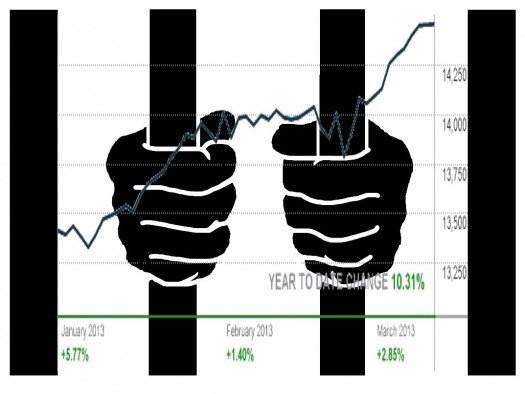
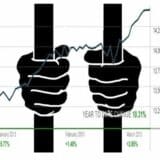
 How will America, which espouses the virtues of forgiveness and freedom, successfully deal with the thousands of people who leave its prisons every year? As the nation with the highest incarceration rate in the world, the United States has a unique responsibility to chart a different, more humane course towards incarceration. Fifty years after the historic March on Washington helped usher the end of legally sanctioned discrimination, the formerly incarcerated remain stripped of basic rights. In many states they can’t vote, live in public housing or receive public assistance. And so they end up recycled in and out of some of America’s most deplorable institutions.
How will America, which espouses the virtues of forgiveness and freedom, successfully deal with the thousands of people who leave its prisons every year? As the nation with the highest incarceration rate in the world, the United States has a unique responsibility to chart a different, more humane course towards incarceration. Fifty years after the historic March on Washington helped usher the end of legally sanctioned discrimination, the formerly incarcerated remain stripped of basic rights. In many states they can’t vote, live in public housing or receive public assistance. And so they end up recycled in and out of some of America’s most deplorable institutions.
In the same way that Mississippi or Alabama were vital battlefronts in the struggle for civil rights a half century ago, California, with the country’s largest prison population, is ground zero for what many see as the major social and political issue of today. Like other states in the 1980s and 1990s,
» Read more about: Breaking Our Addiction to Incarceration »


At first glance, it is one of the nation’s hottest new education-reform movements, a seemingly populist crusade to empower poor parents and fix failing public schools. But a closer examination reveals that the “parent-trigger” movement is being heavily financed by the conservative Walton Family Foundation, one of the nation’s largest and most strident anti-union organizations, a Frying Pan News investigation has shown.
Since 2009, the foundation has poured more than $6.3 million into Parent Revolution, a Los Angeles advocacy group that is in the forefront of the parent-trigger campaign in California and the nation. Its heavy reliance on Walton money, critics say, raises questions about the independence of Parent Revolution and the intentions of the Walton Family Foundation.

While Parent Revolution identifies the Walton Family Foundation as one of several donors on its Web site,
» Read more about: Public Schools, Private Agendas: Parent Revolution »

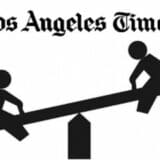
James Rainey’s L.A. Times story, “Garcetti, Greuel Step Gingerly Around City Labor Issues,” shows the problem with the press’ approach to writing so-called “balanced” stories.
Rainey’s story is generally a good one, filled with facts and figures. He’s even careful to use his data to set the record straight when it contradicts what one of his interviewees says. For example, after the County Federation of Labor’s Maria Elena Durazo says “that the average city worker receives $32,000 in retirement,” Rainey writes, “The website for the city’s civilian retirement system puts the average pension benefit for 12,000 current retirees about 40 percent higher than Durazo’s figure.”
Okay, so he checks Durazo’s stats and she appears to be mistaken.
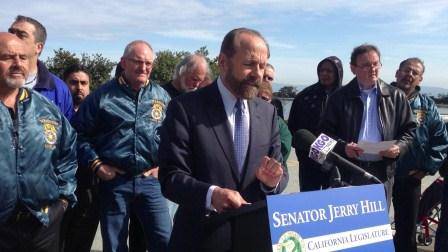

Imagine a system that gives companies enormous tax breaks for firing workers – and then forces those jobless workers to pay for those tax breaks themselves.
It might sound outrageous, but in California, that’s the reality. Just ask Joan Beighley, who worked at VWR in Brisbane for 14 years before her job was eliminated when her employer decided to take advantage of the state’s wasteful “enterprise zone” (EZ) corporate tax giveaway program. Thanks to this flawed program, VWR is able to collect up to $37,000 for each worker the company fired and replaced when they shut down their Brisbane facility and relocated to Visalia – even though no new jobs were created, and the jobs in Visalia pay a fraction of what the Brisbane workers earned for the same work.
The VWR move cost the city of Brisbane more than $2 million a year, while the company took in a windfall $1.5 million,
» Read more about: Law Proposed to Stop Enterprise Zone Tax Giveaways »
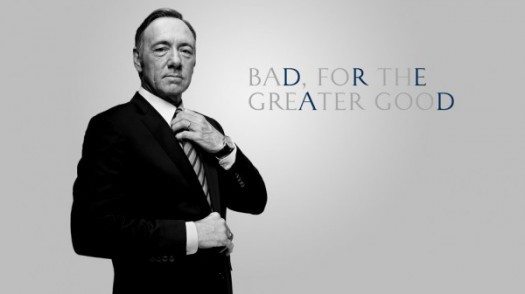

Netflix’s new House of Cards series offers an inside look at Beltway power games and is far better than most of this genre—which is why its retrograde and even racist union-bashing is so unfortunate. For example, Episode Five sympathetically portrays politicians who lie to unions, and claims eliminating federal funding for school districts engaged in collective bargaining is necessary for education reform.
Teachers’ unions are shown as completely out of touch with members, and run not by their female and African-American elected political leadership but rather by white male political consultants. And in an episode that could have been produced by either Michelle Rhee or the National Right to Work Committee, House of Cards depicts elite interests as knowing better what workers want than their own unions. Beneath its plot turns and star power, the series — whose theme is “Bad,
» Read more about: “House of Cards” No Friend to the House of Labor »
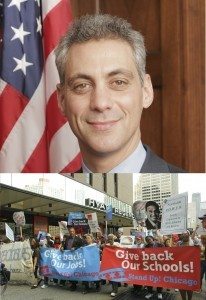

 Sometimes you have to just love the California state constitution. It may right now be the one thing protecting us from the chaos inflicted on Chicago, where the largest mass closure of public schools in U.S. history is underway.
Sometimes you have to just love the California state constitution. It may right now be the one thing protecting us from the chaos inflicted on Chicago, where the largest mass closure of public schools in U.S. history is underway.
You might remember when Antonio Villaraigosa was first elected Mayor of Los Angeles. One of his first ambitions was to become the decision-maker over the L.A. Unified School District, to once-and-for-all improve the city’s schools. He wanted to have the power of other big-city mayors like Chicago’s Emanuel and Bloomberg in New York, mayors who now appoint their school boards and their school superintendents.
These two men, with scant education experience, were sure they could do better than life-long educational professionals. They had been elected to run their cities, not their cities’ schools. But, hey, ambition knows no limits. And with the backing of the multimillionaires of the Gates,
» Read more about: School Daze: The Attack on Public Education Continues »


“Independent Contractor represents that Independent Contractor is an independent contractor.”
I try to cultivate an appreciation for language, linguistic uses and linguistic misuses. I have an especial appreciation for legal writing, in all of its absurdity. I tend to become inured to the way that people – typically more powerful people – use language to obscure rather than to elucidate.
I also read a lot of legal documents, especially agreements between port trucking companies and individual drivers. These tend to be awful, one-sided, unconscionable documents. Port trucking companies employ drivers, and then write “CYA” documents to attempt to hide the fact that they are misclassifying their drivers. The owners create sham truck leases and force drivers to sign them. All par for the course in an industry as dysfunctional as port trucking.
But then I read a sentence like that one,
» Read more about: The Crooked Language Behind Job Misclassifications »


 It’s not every day that L.A. voters are given the chance to hear a range of the city’s political candidates explain their positions on vital issues in a daylong, in-depth forum. But that’s exactly what’s being offered Monday April 1 for Angelenos who are eager to learn what their potential leaders believe in.
It’s not every day that L.A. voters are given the chance to hear a range of the city’s political candidates explain their positions on vital issues in a daylong, in-depth forum. But that’s exactly what’s being offered Monday April 1 for Angelenos who are eager to learn what their potential leaders believe in.
Join Climate Resolve, LAANE and scores of other environmental and community organizations for a candidate forum on April 1. Candidates for Los Angeles City Council, City Controller and City Attorney will outline their positions on key issues regarding the environment, transportation, and jobs.
This is an exclusive chance to understand each candidate’s position on the critical, far-reaching issues that will determine how Los Angeles will address the challenges ahead.
WHEN: Monday, April 1, 9:00am – 4:00pm. You can attend some or all of the discussions.
WHERE: Yosemite Hall at the California Endowment,
» Read more about: L.A. Candidate Forum on the Environment, Transportation and Economy »


 The minimum wage is back on the rise. Last month Sen. Tom Harkin and Rep. George Miller introduced the Fair Minimum Wage Act of 2013, which would raise the federal wage to $10.10. State legislatures aren’t waiting. The New York state assembly approved an increase to $9 plus indexing, the New Mexico state senate approved an increase to $8.50, and the Hawaii state senate and house each passed increases.
The minimum wage is back on the rise. Last month Sen. Tom Harkin and Rep. George Miller introduced the Fair Minimum Wage Act of 2013, which would raise the federal wage to $10.10. State legislatures aren’t waiting. The New York state assembly approved an increase to $9 plus indexing, the New Mexico state senate approved an increase to $8.50, and the Hawaii state senate and house each passed increases.
But that hasn’t stopped the doomsayers. The conservative Cato Institute called the minimum wage “zombie economics.” Paul Ryan said that “history is very clear” that it “costs jobs.” Marco Rubio said that “We have a lot of history to prove” that “raising the minimum wage does not grow the middle class.”
In fact, the historical record is quite clear. “Consider the Source: 100 years of Broken Record Opposition to the Minimum Wage,
» Read more about: What ‘Zombie Economics?’ The Minimum Wage & Its Critics »
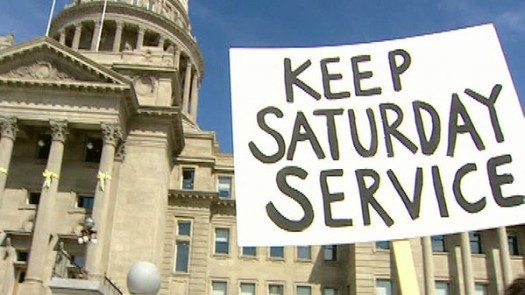

Over the past couple of months, lead stories on every media outlet across this nation have covered the “gloom and doom” angle of six-day postal delivery. But last Sunday, thousands of Letter Carriers, union members and allies came out to set the story straight on the real crisis that is facing the United States Postal Service.
In San Diego, Los Angeles, Fresno and San Francisco, rally participants let the communities they serve know that if the overzealous plan by Postmaster General Patrick Donahoe to eliminate Saturday mail delivery is allowed to happen, it would be one of the biggest mistakes our government would ever make.
Rally participants set the facts straight by letting everyone know that regardless of what he has been threatening to do, Postmaster Donahoe lacks the legal authority to implement this plan on his own. Decisions on delivery schedule are the purview of Congress, and every year for the past 30 years,
» Read more about: Postal Rallies: “Save Saturday Mail Delivery!” »


 We’re still legislating and regulating private morality, while at the same time ignoring the much larger crisis of public morality in America.
We’re still legislating and regulating private morality, while at the same time ignoring the much larger crisis of public morality in America.
In recent weeks Republican state legislators have decided to thwart the Supreme Court’s 1973 decision in “Roe v. Wade,” which gave women the right to have an abortion until the fetus is viable outside the womb, usually around 24 weeks into pregnancy.
Legislators in North Dakota passed a bill banning abortions after six weeks or after a fetal heart beat had been detected, and approved a fall referendum that would ban all abortions by defining human life as beginning with conception. Lawmakers in Arkansas have banned abortions within twelve weeks of conception.
The morality brigade worries about fetuses, but not what happens to children after they’re born. They and other conservatives have been cutting funding for child nutrition, healthcare for infants and their mothers,


 Spring equinox always arrives in what feels like the middle of winter. Snow falls in the Northwest while the Northeast tries to dig out from under the most recent storm and ice still covers Midwestern roads. Even in Los Angeles, spring does not really feel like, well, spring until sometime in late April or early May. The foundational spring stories of the Northern Hemisphere also have that hidden element.
Spring equinox always arrives in what feels like the middle of winter. Snow falls in the Northwest while the Northeast tries to dig out from under the most recent storm and ice still covers Midwestern roads. Even in Los Angeles, spring does not really feel like, well, spring until sometime in late April or early May. The foundational spring stories of the Northern Hemisphere also have that hidden element.
Passover in the Jewish tradition tells the story of a people oppressed by enslavement in Egypt, the dominant empire of its time. Over and over again terrible experiences overtake the land, but the slave masters refuse to let go. A plague of frogs is not enough. Nor locusts. Nor dying animals. Nine times the plagues come and the masters will not relent. Then, suddenly, with number ten, the slaves are released, or actually, told to leave. It could have happened after the first disaster.
» Read more about: Spring’s Awakening and the Dawn of Change »